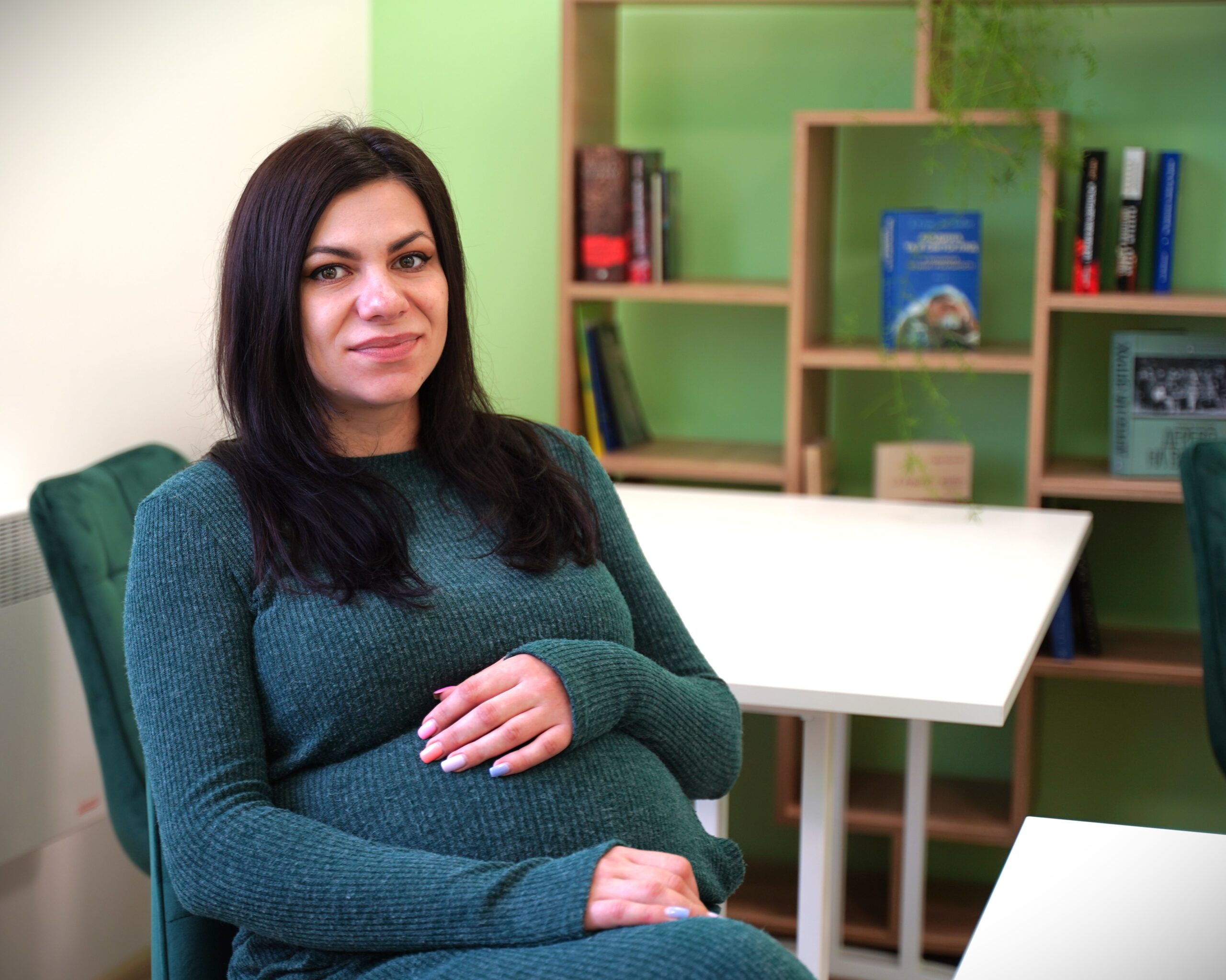
Dariia Markovych and her team initiated the creation of the Integration Hub "Platform of Joint Actions" in Mukachevo. © UNHCR/Victoria Andrievska
Dariia Markovych hails from Mariupol in southern Ukraine. An active citizen, she was one of the dedicated members of the Mariupol Youth Council, launching programs for youth entrepreneurship and providing grants for the development of business projects created by young people.
When the full-scale invasion reached Mariupol in March, Dariia hoped it would end in a few days. She and her mother felt it was important to stay in Mariupol, to defend their home and to support their fellow citizens. However, shelling continued day after day, drawing nearer and nearer to their house. Their city was heavily bombarded, cutting off access to essential services. ‘The mobile connection and water supply were disconnected. We had to fetch water from far away wells, stepping over dead bodies on the street. It was horrible and very scary,‘ recalls Dariia. ‘On 16 March, a bomb exploded next to our home and blew in the windows of our house. The blast wave seriously damaged my mother’s eyes. It was at this point that I said, “Enough is enough; we need to flee for our safety.”’
Dariia quickly packed her belongings, and with her mother, friend, and three cats, embarked on the terrifying and uncertain journey amidst shelling, forced to stop occasionally for check-point searches.
Arriving in Zakarpattia ten days later, Dariia could finally breathe a sigh of relief. The region was hosting many others who had fled hostilities. ‘We already were familiar with similar crises after the beginning of hostilities in eastern Ukraine in 2014, when there were plenty of IDPs from Donbas who had sought safety in Mariupol and the region. In 2014, humanitarian needs were huge, and many required psychosocial support for the trauma they had experienced. Eight youth centres quickly opened in Mariupol at that time in addition to centres for families and humanitarian aid. So, we knew how to set up systems to meet the needs of displaced people’ explains Dariia.
‘Displacement is challenging for both internally displaced people (IDPs) and the communities generously hosting them. Overnight, local people open their homes to people who have had to flee, but this can also put pressure on existing services. But, if we can harness the skills and talents of IDPs, there is a great opportunity for the whole of the community to develop,’ she added.
‘In Mariupol, there were many spaces where young people could meet, discuss their ideas, and use the space to work with a laptop or to organize training. In Mukachevo, access to these kinds of spaces was more limited,’ says Dariia. Just about a year ago, Dariia and others organized a town hall with 50 local civil society organizations and the local community to discuss the needs of the communities. The meeting was positively received, and many constructive ideas were proposed, including the need to establish common spaces for young people.
“It was during communication with local youth that we learned that the city is in need of a recording studio because young local musicians do not have the opportunity to record their music there. Other elements of the future hub were also proposed during that meeting,” recalls Dariia.
An important feature of the hub is that it meets universal design requirements. “It is important that the hub brings everyone together without leaving anyone behind. The hub was created as a completely barrier-free space. The building has a barrier-free entrance, an elevator to the second floor, and is equipped with barrier-free restrooms. Here, active citizens coming from different regions of Ukraine will be able to continue their civic activities and work on new projects,” says Dariia.
The local authorities offered the premises, and extensive renovations took place, taking into account all state building regulations and the arrangement of barrier-free premises. In parallel with the major renovation, the participants from the Mukachevo Youth Council were trained. Young people mastered the skills of facilitation, moderation, conflict resolution, and project management. A recording studio, a design thinking room, a meeting room, and a training room were created. International partners – the United Nations Development Programme (UNDP), the UN Refugee Agency (UNHCR), and the European Union actively participated. They assisted with the repair and arrangement of the hub. The Integration Hub is hosted in the Centre for Public and National Culture.
The project became Dariia’s main goal – she worked every day to bring this idea to life. “I am pregnant, and in two weeks, I will give birth to a child, but I was so busy that I almost did not notice how quickly the due date was approaching. I think the child will be very strong because we have already had to overcome many challenges together.”
After finishing the work on the hub, Dariia dreams of returning home to Mariupol. “I really want to go home. People who fled Mariupol, Kherson, Bakhmut, Donetsk or Luhansk regions, all dream that their cities will be back to being controlled by the Government of Ukraine. We are transferring our experience to local communities in other regions now so that they can continue similar activities on thier own when we go home. I believe that it will happen very soon. I want to see my sea. And further – we have a lot of work to do in the rebuilding of our hometowns and Ukraine as a whole,” says Dariia.
Share on Facebook Share on Twitter